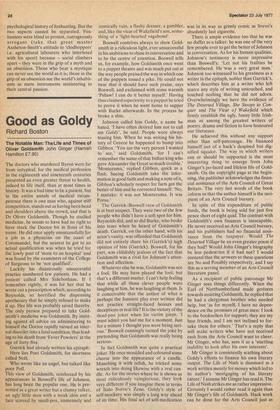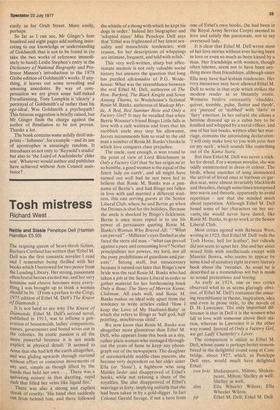Good as Goldy
Richard Boston
The Notable Man: The Life and Times of Oliver Goldsmith John Ginger (Hamish Hamilton £7.95) The doctors who murdered Byron were far from untypical, for the medical profession in the eighteenth and nineteenth centuries presented an even greater threat to health, indeed to life itself, than at most times in history. It was a bad time to be a patient, but in the entire annals of medical incompetence there is one man who, against stiff competition, stands out as having been head and shoulders above the crowd, and that is Dr Oliver Goldsmith. Though he studied medicine, he seems to have had no right to have stuck the Doctor bit in front of his name. He did once apply unsuccessfully for a job as a physician on the coast of Coromandel, but the nearest he got to an actual qualification was when he tried for the lowly post of 'mate to an hospital' and was found by the examiners of the College of Surgeons to be 'not qualified'.
Luckily his disastrously unsuccessful practice numbered few patients. He had a patient called Mrs Sidebotham. If I remember rightly, it was for her that he wrote out a prescription which, according to Reynolds, so horrified the dispensing apothecary that he simply refused to make it up. Her life was probably saved thereby.
The only person prepared to take Gold smith's medicine was Goldsmith. By insisting against all advice on administering to himself the Doctor rapidly turned an internal disorder into a fatal condition, thus leading to his death from 'Fever Powders' at the age of forty-five.
Garrick had already written his epitaph: Here lies Poet Goldsmith, for shortness called Noll, Who wrote like an angel, but talked like poor Poll.
This view of Goldsmith, reinforced by his appearances in Boswell's life of Johnson, has long been the popular one. He is presented as a great writer but a clumsy talker, an ugly little man with a weak chin and a face scarred by small-pox, immensely and comically vain, a flashy dresser, a gambler, and, like the vicar of Wakefield's son, something of a `light-hearted vagabond'.
Boswell contrives always to show Goldsmith in a ridiculous light, ever unsuccessful in his ambitions to shine in conversation and to be the centre of attention. Boswell tells us, for example, how Goldsmith once went to a puppet theatre and was much put out at the way people praised the way in which one of the puppets tossed a pike. He could not bear that it should have such praise, says Boswell, and exclaimed with some warmth `Psliawl I can do it better myself.' Having thus claimed superiority to a puppet he tried to prove it when he went home to supper with Burke afterwards. In the process he broke a shin.
Johnson called him Goldy, a name he hated. 'I have often desired him not to call me Goldy', he said, People were always teasing him. When he was writing his history of Greece he happened to bump into Gibbon. 'You are the very person I wanted to see,' said Goldsmiths 'for I can't remember the name of that Indian king who gave Alexander the Great so much trouble.' 'Montezuma,' replied Gibbon, quick as a flash. Seeing Goldsmith take the information in good faith and making a note of it, Gibbon's scholarly respect for facts got the better of him and he corrected himself: 'No, I mistake: it was not Montezuma. It was Porus.'
The Garrick—Boswell view of Goldsmith is at best suspect. They were two of the few people who didn't have a soft spot for him. Reynolds did, and so did Burke, who broke into tears when he heard of Goldsmith's death. Garrick, on the other hand, with his actor's vanity, was offended that Goldsmith did not entirely share his (Garrick's) high opinion of him (Garrick). Boswell, for his part, was childishly jealous of the fact that Goldsmith was a rival for Johnson's attention and affection.
Whatever else he was, Goldsmith was not a fool. He may have played the fool, but that's a different matter. I can't help feeling that while all those clever people were laughing at him, he was laughing at them. Is it conceivable that the author of what is perhaps the funniest play ever written did not practice straight-faced hoaxes and deceptions in real life? It is the victory of the dead-pan joker when his victim gasps, 'I must admit you had me for a moment. Just for a minute I thought you were being serious.' Boswell cunningly turned the joke by pretending that Goldsmith was really being serious.
In fact Goldsmith was quite a practical joker. He once moulded and coloured some cheese into the appearance of a candle. Munching it with relish, he tricked some wretch into doing likewise with a real candle. As for the stories where he is shown as most ridiculously vainglorious, they look very different if you imagine them in terms of Italo Svevo's Zeno. Goldy's style of self-mockery was simply a long way ahead of its time. His final act of self-medication
was in its way as grimly comic as Svevo's absolutely last cigarette.
There is ample evidence too that he was no duffer as a talker: he was one of the very few people ever to get the better of Johnson in conversation. As for his human qualities, Johnson's testimony is more impressive than Boswell's: 'Let not his frailties be remembered. He was a very great man.' Johnson too witnessed to his greatness as a writer in the epitaph, nobler than Garrick's, which describes him as a writer who left scarce any style of writing untouched, and touched nothing that he did not adorn. Overwhelmingly we have the evidence of The Deserted Village, She Stoops to Conquer and The Vicar of Wakefield which firmly establish the ugly, funny little Irishman as among the greatest writers of poetry, drama and fiction to have honoured our literature.
He achieved this without any support other than self-patronage. He financed himself out of a hack's despised but dignified squalor. The way in which writers can or should be supported is the most interesting thing to emerge from John Ginger's po-faced and lifeless life of Goldsmith. On the copyright page at the beginning, the publisher acknowledges the financial assistance of the Arts Council of Great Britain. The very last words of the book iaform us that the author himself is the recipient of an Arts Council bursary.
In spite of this expenditure of public funds, the book is being sold for just five pence short of eight quid. The contrast with Goldsmith's own finances is inescapable. He never received an Arts Council bursary, and his publishers had no financial assistance from the taxpayer. Would The Deserted Village be an even greater poem if they had? Would John Ginger's biography be less pedestrian if it had not? I would contend that the answers to these questions are No and Possibly respectively, and I say this as a serving member of an Arts Council literature panel.
As a recipient of public patronage Mr Ginger sees things. differently. When the Earl of Northumberland made gestures towards assisting Goldsmith, he replied that he had a clergyman brother who needed help, but 'as for myself, I have no dependence on the promises of great men: I look to the booksellers for support; they are my best friends, and I am not inclined to forsake them for others.' That's a reply that will make writers who have not received cash from the Arts Council want to cheer. Mr Ginger, who has, sees it as a 'startling inability to look after his own interests'.
Mr Ginger is consistently scathing about GoIdy's efforts to finance his own literary output. The Life of Nash is dismissed as a work written merely for money which led to its author's 'mortgaging of his literary career.' I assume Mr Ginger has read it. The Life of Nash strikes me as rather impressive. Certainly I would rather read it again than Mr Ginger's life of Goldsmith. Hack work can be done for the Arts Council just as easily as for Grub Street. More easily, perhaps.
So far as 1 can see, Mr Ginger's four hundred and eight pages add nothing interesting to our knowledge or understanding of Goldsmith that is not to be found in (to take the two works of reference immediately to hand) Leslie Stephen's entry in the Dictionary of National Biography and Professor Masson's introduction to the 1878 Globe edition of Goldsmith's works. If anything, it leaves out some revealing and amusing anecdotes. By way of compensation we are given some half-baked Freudianising. Tony Lumpkin is 'clearly' a portrayal of Goldsmith's id rather than his ego-ideal. Was Goldsmith a psychopath? This fatuous suggestion is briefly raised, but Mr Ginger finds the charge against the author of Retaliation to be not proven. Thanks a lot.
The book contains some mildly droll misprints — `Johnsno', for example — and its use of apostrophes is amusingly random. It introduces us not only to 'Reynold's studio' but also to 'the Laird of Auchinlechs' elder son'. Whatever would author and publisher have achieved without Arts Council assistance?







































 Previous page
Previous page